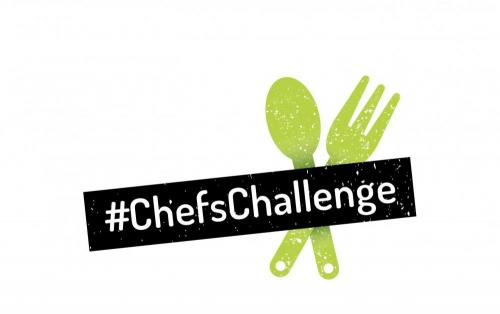
https://www.unicef.org/eap/stories/chefs-unite-better-food-east-asia-pac...
As part of UNICEF East Asia & Pacific’s #ChefsChallenge, they have been using their channels to inspire young people to try cooking healthy meals while confined at home during the COVID-19 pandemic. The response has been tremendous, with 600,000 people engaging with the videos – from likes and shares to discussions about how to reduce the bitterness of ‘ampalaya’ (bitter gourd).
The Chefs Challenge was initiated by UNICEF in direct response to the COVID-19 pandemic. But this is not a short-term project.
COVID-19 has exposed deep flaws in the food system which means that 25 million children in the region are currently malnourished because they lack access to healthy diets and nutritious foods. These children are not just suffering from undernutrition, but also from a lack of vitamins and minerals and, most worrying, from overweight and obesity which affects three times as many children in the region today compared to 20 years ago.
Reconnecting with our food
Robert Oliver, chef, television personality and producer of Pacific Island Food Revolution, has already been working in the region to raise awareness around the impact of unhealthy diets. “There has been a fundamental shift in the way people are eating. Many people have moved away from their original cuisines and the natural food system to more of an industrial modality dependent on packaged foods. The result is an explosion of obesity in the region - and obesity kills people.”
A key way to combat this trend is by educating and empowering young people about food, and reconnecting them with cuisine.
Chef Ian Kittichai, an award-winning chef, restaurateur and well-known as the lead judge on MasterChef Junior Thailand is aware of the power of his voice through social and mainstream media. “My experience of MasterChef Junior, which attracted millions of viewers in 2019, showed me that children are really curious about food and cooking, and they want to learn more. Health may not be their first concern but they are passionate about experimenting with different flavours and new recipes. We shouldn’t underestimate the potential of children to understand and achieve.”
The COVID-19 pandemic has been devastating, but it may also be the trigger needed to reform the food system. It is critical that the sale of processed foods, packed with sugar, salt and fat, is reduced and replaced with fresh, locally produced, nutritious food and drink. Stimulating local agricultural production will also be crucial to provide employment and reduce transport cost, especially important in the context of COVID-19.
As Cherrie Atliano, Filipino farmer and social entrepreneur notes: “We need to empower farmers to make farming methods more efficient and ecofriendly. A huge amount of food from the farm doesn’t make it to our tables because consumers either don’t know how to cook certain vegetables or markets avoid ‘ugly’ fruits. We’re trying to change this at AGREA to give a second chance to food and also create more opportunities for farmers and chefs - providing healthy food and innovation under the new normal.”
Locally grown food means shorter supply chains and fresher food in local markets. This is the vision of Vietnamese American Chef Peter Cuong Franklin of Anan Restaurant in Ho Chi Minh City: “Fresh ingredients sourced from local markets at reasonable prices are fundamental to the vibrant food culture of this region. We must ensure that ‘wet’ markets survive and continue to provide the diverse range of fruit, vegetables and other nutritious produce that are the mainstay for many disadvantaged families.”
Unfortunately, such markets have suffered bad press recently, because the name not only covers traditional vegetable and meat markets, but also wild animal markets associated with the origin of the coronavirus, so guaranteeing hygiene standards and safe food is a priority.
The rise of faster, cheaper food
Traditional markets are rapidly being overtaken by fast food outlets that are becoming ubiquitous throughout the region. Many of these outlets are run by multi-national chains and sell Western-style pizzas, burgers, French fries and fizzy drinks. The need to champion healthy traditional foods and dishes, to displace the growing dependence on fast foods is being echoed by chefs throughout the region.
Chef Nak travels around Cambodia rediscovering and documenting unwritten recipes, often found in remote parts of the country in the minds of village elders. “My journey through food brings to the table the story of traditional cuisine before it disappears in the rush of modernity. Food is not purely for survival. It is the taste of home, the flavour of who we are,” she says. The cultural dimensions of food and drink should not be forgotten.
Governments have an important role to play in reforming the food system. They can introduce policies and legislation on a range of aspects from subsidizing the local production of fruit and vegetables to price and marketing controls. Enforcing these measures is another question, however.
Engaging youth for a healthier tomorrow
Without widespread public support, laws are broken and policies fail to be effective. This is where the chefs come in through their considerable capacity to influence young people.
Phan Anh, food blogger and founder of Esheep Kitchen has been using social media for several years. “It is important to engage children and young adults, and that means being innovative and fun. The kitchen is always a colorful and mystery world which every kid is eager to explore. Some of my videos are shot in my kitchen at home with my children. The dishes are simple and natural – but, importantly, can still be inspiring.”
The Chefs Challenge will not end when the COVID-19 pandemic finally recedes. Rather it signals the start of a broader campaign by UNICEF East Asia & Pacific to work with ‘influencers’ across the board to inspire children to demand a better food system. This food system must deliver safe, sustainable and nutritious food, protect traditional cuisines and most important of all, promote the joy of preparing food.










Add new comment